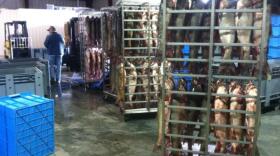Hog farmers are now required to report outbreaks of certain viral diseases that have spread across the country during the past year, according to the U.S. Department of Agriculture.
Until now, two strains of the porcine epidemic diarrhea virus and swine delta coronavirus, which is similar to PED but not as lethal, had not been considered reportable diseases. That’s partly because they do not pose any food safety or human health threat. But the rapid spread of PED, in particular, has led to huge losses in the pork supply because the disease can wipe out entire litters of piglets.
The USDA hopes that the new information will help quell the spread of the virus. But Iowa State University veterinarian Rodney Baker says the reporting requirement may be too little too late.
“Reporting itself doesn’t help us with the disease at all,” Baker said, “unless there’s some action taken through the reporting process that prevents the spread of the disease.”
Baker says it’s not yet clear whether the department will take further action. But he recognizes that mandatory reporting is an important step.
“We certainly need to get this in place,” he said. “Knowing that these diseases managed to get through our border biosecurity tells us that there’s a lot of other ones out there that could affect trade.”
Baker says U.S. pork producers earn 20 to 25 percent of their income from the export market. Lessons learned in controlling PED and delta coronavirus could be useful when the next new disease enters this country, Baker says. For now, the reporting change doesn’t call for restrictions on movement or trade.
And Baker says it may improve the accuracy of loss estimates, which until now relied on voluntary reporting. He’s hopeful a hot summer, tighter biosecurity measures and the increased paper trail reporting will generate may all combine to prevent a widespread outbreak of PED next winter.













